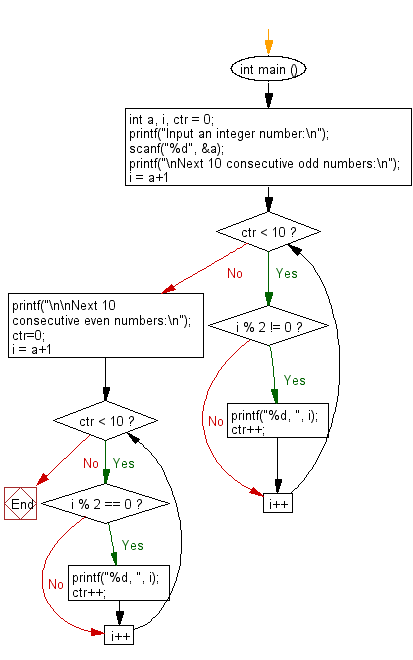C Exercises: Accept an integer and print next ten consecutive odd and even numbers
Print next 10 odd and even numbers after a given integer
Write a C program that prints ten consecutive odd and even numbers after accepting an integer.
Sample Solution:
C Code:
#include <stdio.h>
int main () {
int a, i, ctr = 0;
// Prompt the user to input an integer number
printf("Input an integer number:\n");
scanf("%d", &a);
// Print the next 10 consecutive odd numbers
printf("\nNext 10 consecutive odd numbers:\n");
for (i = a + 1; ctr < 10; i++){
if (i % 2 != 0){
printf("%d, ", i);
ctr++;
}
}
// Reset counter for even numbers
ctr = 0;
// Print the next 10 consecutive even numbers
printf("\n\nNext 10 consecutive even numbers:\n");
for (i = a + 1; ctr < 10; i++){
if (i % 2 == 0){
printf("%d, ", i);
ctr++;
}
}
}
Sample Output:
Input an integer number: 15 Next 10 consecutive odd numbers: 17, 19, 21, 23, 25, 27, 29, 31, 33, 35, Next 10 consecutive even numbers: 26, 28, 30, 32, 34, 36, 38, 40, 42, 44,
Flowchart:

For more Practice: Solve these Related Problems:
- Write a C program to generate the next ten odd and even numbers using modular arithmetic and loops.
- Write a C program to compute and display two separate sequences: one for the next ten odd and one for the next ten even numbers.
- Write a C program that uses recursion to print the next ten odd and even numbers starting from a given integer.
- Write a C program to accept an integer and then use two functions to print the subsequent odd and even sequences concurrently.
Go to:
PREV : Count even, odd, positive, and negative values from 7 integers.
NEXT : Sum odd and even numbers between two integers.
C programming Code Editor:
Have another way to solve this solution? Contribute your code (and comments) through Disqus.
What is the difficulty level of this exercise?
Test your Programming skills with w3resource's quiz.
